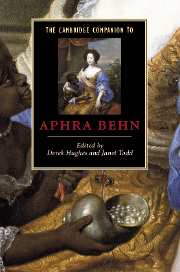Book contents
- Frontmatter
- 1 Aphra Behn: The Documentary Record
- 2 Behn, women, and society
- 3 Aphra Behn and the Restoration theatre
- 4 The political poetry of Aphra Behn
- 5 Behn’s dramatic response to Restoration politics
- 6 Tragedy and tragicomedy
- 7 Behn and the unstable traditions of social comedy
- 8 The Cavalier myth in The Rover
- 9 ‘The story of the heart’: Love-letters between a Noble-Man and his Sister
- 10 Oroonoko: reception, ideology, and narrative strategy
- 11 ‘Others’, slaves, and colonists in Oroonoko
- 12 The short fiction (excluding Oroonoko)
- 13 Pastoral and lyric: Astrea in Arcadia
- 14 Aphra Behn’s French translations
- Further reading
- Index
- Series list
2 - Behn, women, and society
Published online by Cambridge University Press: 28 May 2006
- Frontmatter
- 1 Aphra Behn: The Documentary Record
- 2 Behn, women, and society
- 3 Aphra Behn and the Restoration theatre
- 4 The political poetry of Aphra Behn
- 5 Behn’s dramatic response to Restoration politics
- 6 Tragedy and tragicomedy
- 7 Behn and the unstable traditions of social comedy
- 8 The Cavalier myth in The Rover
- 9 ‘The story of the heart’: Love-letters between a Noble-Man and his Sister
- 10 Oroonoko: reception, ideology, and narrative strategy
- 11 ‘Others’, slaves, and colonists in Oroonoko
- 12 The short fiction (excluding Oroonoko)
- 13 Pastoral and lyric: Astrea in Arcadia
- 14 Aphra Behn’s French translations
- Further reading
- Index
- Series list
Summary
Advocates for dramatically different ideologies about women's nature and women's appropriate function in society clashed with one another in Aphra Behn's lifetime. Although some of these ideologies claimed to be traditional, none of them was simply so. Behn's plays, fiction, and poems raise acute questions about these ideologies and make it clear that she found none of them entirely satisfactory. Here I will consider three of these clashing ideologies: first, the Church of England religious ideology, at once the dominant ideology of Behn's society and the one with which she had the least sympathy; second, an economic and legal ideology; and third, the libertine ideology, the one that Behn in many ways found attractive, but one that seemed to work better for men than for women. Each of these ideologies had very different understandings of what the value of women was and I will conclude with a discussion of Behn's inventive exploration of the problem of women's value. Although the majority of women in Behn's society belonged to the labouring and yeoman classes - toiling in agriculture, in work like the spinning of wool, in domestic service, or as the daughters or wives of small farmers - these sorts of women are not important characters in Behn's works, so I will focus here mainly on women from the higher social classes who are her principal concern.
The Church
It would be difficult to discern from Behn’s writings that the dominant ideology during the period when she wrote was that of the Church of England. Churches in Behn’s plays and fiction, usually Roman Catholic churches on the continent, typically appear as places where men and women discover their lovers and make assignations, not places of devotion. Her wits display their cleverness in blasphemy. Nevertheless, the overwhelming majority of Behn’s English contemporaries belonged to the Church of England and respected its religion.
- Type
- Chapter
- Information
- The Cambridge Companion to Aphra Behn , pp. 12 - 28Publisher: Cambridge University PressPrint publication year: 2004
- 1
- Cited by



